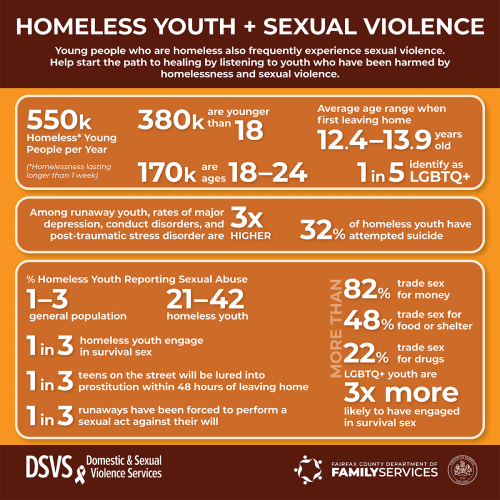(Posted 2024 November)
 Homeless young people lack the securities those with shelter do not. Many people experiencing homelessness struggle with financial stability, mental health, substance use disorders, and systemic barriers. In addition to these challenges, many people will experience a sexual assault while being homeless.
Homeless young people lack the securities those with shelter do not. Many people experiencing homelessness struggle with financial stability, mental health, substance use disorders, and systemic barriers. In addition to these challenges, many people will experience a sexual assault while being homeless.
Youth who are homeless face a higher risk of being victims of violence, especially sexual violence. The relationship between sexual violence and homelessness is complicated: sexual violence is both a contributor to homelessness and a factor resulting from homelessness. The infographic accompanying this article focuses on the link that exists between youth homelessness and sexual violence.
To understand the scope of the problem, compare rates of sexual violence among youth in the general population to rates of sexual violence among youth living in homelessness. The infographic shows a startling 21-42% of homeless youth nationwide report sexual abuse compared to 1%-3% of youth in the general population. It doesn’t require giant leaps in logic to see living on the streets dramatically increases the risk of being a victim of sexual violence.
Among homeless youth, certain groups are at an even higher risk of being victims of sexual violence. Members of the LGBTQ+ community face a higher risk of being trafficked and LGBTQ+ youth experiencing homelessness are roughly 7.4 times more likely to experience sexual violence than heterosexual youth. One survey of homeless youth found among female youth, black girls were more likely to be victims of sexual assaults (47%) than white girls (33%).
Practitioners believe these numbers are low because many assaults go unreported. This means statistics don’t show a full picture of the rate of violent crime against homeless youth; the true figure is likely far higher than these numbers suggest. Stigma, victim-blaming, and self-blame play a role in keeping youth from speaking up about the problems they are facing.
Despite this knowledge, there are not enough specialized housing initiatives for homeless youth. In October, the U.S. Department of Housing and Urban Development announced $72 million to fund youth homelessness housing in 11 states. This funding, through HUD’s Youth Homelessness Demonstration Program, is designed to support housing solutions, such as rapid rehousing, permanent supportive housing, transitional housing, and host homes. In Fairfax County, the Second Story for Homeless Youth program helps youth with housing, counseling, and life skills, but they report experiencing high demand and limited funding. Fairfax County Public Schools, in partnership with Fairfax County Coordinated Services Planning, provides support for homeless students through the Mckinney-Vento program. And Domestic and Sexual Violence Services can support all people impacted by sexual violence, no matter their age or housing status through its Domestic and Sexual Violence 24-Hour Hotline (703-360-7273).
The incidence of sexual violence among homeless youth has strong implications for the healthy physical, psychological, and emotional development of youth. Strong partnerships between county agencies, nonprofits, and community organizations can ensure measures are in place to protect this population.
If you or someone you know is experiencing interpersonal violence, call the Domestic and Sexual Violence 24-Hour Hotline at 703-360-7273 for resources and support. If you are in immediate danger, call 9-1-1.
This posting is part of the Department of Family Services' Community Corner where you’ll find timely information about upcoming events, parenting and wellness tips, programs and services, and more! Share these helpful posts with your friends and family. Don't miss out on future postings! Sign up today!

